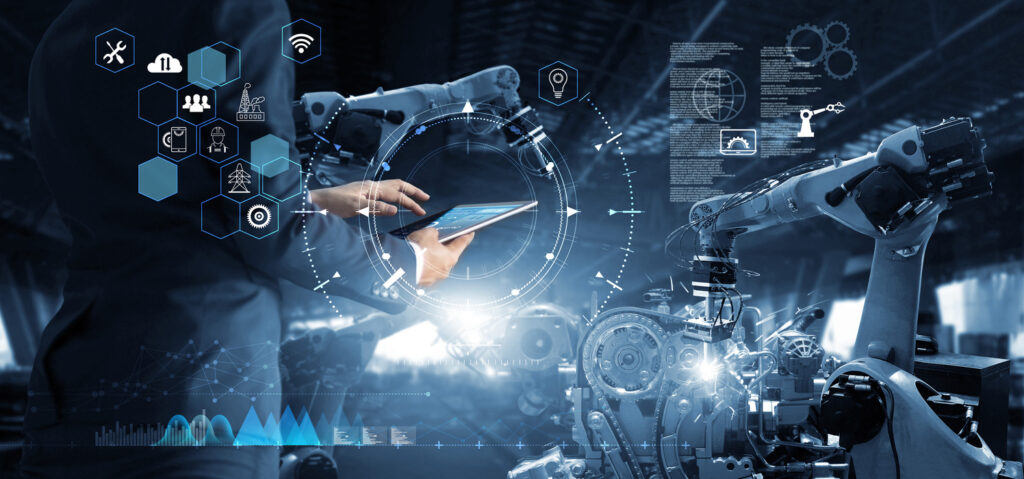We are living in strange and contradictory times; an age where hyper and anti-globalisation exist side by side and where the digitisation of work as marked by the fourth industrial revolution (or industry 4.0) is being envisioned in an increasingly uncertain world.
The impact of industry 4.0 is going to be massive. Both large organisations and SMEs will adopt new technologies in the near future that will completely reconfigure the way we work.
Up until now people have continued to travel around the globe frequently, and countries traded with each other more than ever before. New innovations in technology have been constantly reshaping the way organisations and multinational corporations conduct their businesses. All of this has allowed us to look towards the future with a renewed sense of optimism, but there is still plenty to be concerned about.
Nation states battle with each other for trade dominance, inequality and political upheaval continue to rise, and environmental and demographic changes occur at a far more rapid pace.
The coronavirus pandemic and its impact on health and the economy is of course a major concern. Before, this, the US’s trade war with China, the UK’s exit from the EU, the deteriorating quality of democracy in Latin America, and the bushfires in Australia linked to climate change were also prominent examples.
All of this illustrates the increasing volatility of the times we are living in. In this regard, having a constructive debate about the ‘future of work’ and the impact that automation technology (e.g. artificial intelligence, robotics etc.) will have on jobs, skills and wages becomes even more difficult due to the growing uncertainty and complexity. How will industry 4.0 impact the world now and what implications will this have for HR management? How can HR stay relevant – and useful – during these unprecedented times?
The changing business landscape
There’s no doubt about it – the impact of industry 4.0 is going to be massive. Both large organisations and SMEs will adopt new technologies in the near future that will completely reconfigure the way we work. For example, automation will replace many of the traditional factory jobs, as repetitive work becomes fully digitised. Technologies like augmented and virtual reality will enable organisations to deliver training using simulations to make employees more effective in their jobs.
HR needs to build agility and resilience to thrive in an environment of constant change.
In addition to the implementation of tools and technologies such as automation, robotics, artificial intelligence, virtual reality, big data analytics, cloud computing and the internet of things (IOTs), the structure of jobs is already changing. Instead of in-house staff, more firms are relying on specialised contract or remote workers (the so-called ‘gig economy’). Before the Covid-19 outbreak, increasing numbers of organisations were also pivoting towards remote and flexible working – at the moment, of course, this arrangement has been enforced for many.
In future we can expect to see fewer full-time jobs, as more people work flexibly or undertake ‘portfolio careers’. There will be more frequent job changes and a constant need for workers to acquire new skills as part of their lifelong learning.
These are just a few examples of the many changes industry 4.0 is already bringing. Organisations must now embrace these changes and work to capitalise on the opportunities it creates for them, their employees and their stakeholders.
So, what can HR do to prepare and how can it stay relevant in these uncertain times?
1. Get employees on side
The most important task for HR will be to change internal perceptions and shift the attitudes of employees about the impact that automation and digitisation will have on their jobs. Clear communication is essential here to bring them on board. The more open employees will be to this change, the easier it will be for the HR to implement it.
2. Become a ‘contingent champion’
We have often heard of HR being a strategic partner to organisations but besides being a strategic partner, HR will also need to become a contingent champion. This means that the HR policies and practices will need to be more agile, adaptable and flexible to prepare for any contingencies that employees and the organisation may encounter both internally and externally. Whether it’s transitioning from physical to remote work, or training employees to operate machines in a virtual environment – it’s essential to be prepared. HR needs to build agility and resilience to thrive in an environment of constant change.
3. Invest in training
One of the most critical areas for HR will be to constantly make sure that it devotes resources (e.g. capital, time, technology) to re-skilling and upskilling employees to prepare them for new tasks, roles and jobs. For example, HR will need to deliver online training using new technologies (like virtual reality or artificial intelligence) to impart new cognitive and technical skills, such as, complex problem-solving, analytical thinking, emotional intelligence, innovation, system analysis, technology installation and so on. Additionally, they may also partner with universities to provide digital education opportunities as part of their career development programmes. As new tools, technologies and systems are constantly adopted by organisations, HR will also need to constantly train and retrain the workforce.
4. Deliver ongoing support
HR’s role in providing continued ongoing support, psychological and mental wellbeing and a positive employee experience will be critical in managing the disruptions that industry 4.0 will bring.
For many organisations, this will mean addressing HR grievances, providing individual support and delivering a seamless experience by breaking departmental barriers. Team collaboration tools like WhatsApp For Business or Workplace From Facebook could offer HR the opportunity to support employees in a more personal way, in real time
5. Adjust to new regulations quickly
With all of this new technology will come increased regulation, some of which may pertain to the use of technology or data, and some to employee rights, for example. As these new regulations get introduced, updated or changed, the HR will quickly need to assess their implications for the workforce and will have to adopt and adjust to them in a timely manner.
Overall, it’s clear that industry 4.0 will bring unparalleled opportunities for HR but it will also create major challenges and significant disruptions. Internally, HR will need to transform the working landscape, building a strong network and community. Externally, the challenge will be to quickly adjust to regulatory changes and the new business environment, ensuring that they remain contingent champions.
Interested in this topic? Read Future of work: will HR be buried?












